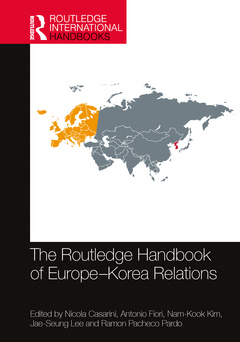The Routledge Handbook of Europe-Korea Relations Routledge International Handbooks Series

The Routledge Handbook of Europe?Korea Relations provides a comprehensive overview of the changing dynamics in relations between Europe and Korea, provided by leading experts in the field.
Informed by high-quality academic research and key trilateral data and statistics, this book brings scope, balance, and depth, with wide-ranging coverage examining the history of Europe-Korea relations, the Cold War, contemporary Europe-Korea and Europe-North Korea relations, Europe and inter-Korea relations within the regional context, and relations between European countries and the Korea. Through this approach, it increases awareness of the extent and intensity of the multi-faceted and multi-layered connections between the Europe and Korea. Finally, it proposes a way forward for a future relationship between Europe and the Koreas. As a key reference point, for advanced-level students, researchers, policy-makers and journalists producing, and consuming, new material in the area and beyond, it provides an essential understanding of both the historical backdrop to, and the current crisis in, this troubled peninsula.
This Handbook will be an essential reference for scholars, students, researchers and practitioners interested and working in the fields of Asian Politics/ Studies, EU Politics/Studies, European Politics/Studies, Korean Politics/Studies and International Relations.
The Routledge Handbook of Europe?Korea Relations is part of the mini-series Europe in the World Handbooks examining EU-regional relations.
Introduction: A Multi-Faceted and Multi-Layered Relationship Part 1: Historical Evolution 1. Korea–Europe Relations from the Origins to 1950 2. The Evolution of Europe and Korea Relations during the Cold War (1950-1990) 3. Contemporary EU-Korea Relations: 1991-2020 Part 2: Social and Cultural Relations 4. Korea-EU Intellectual and Cultural Exchange 5. New Perspectives of Korean Wave: Digital Media and Global Fandom 6. EU-Korea Education Cooperation 7. Immigration as Personal and Cultural Interchange: South Koreans in Germany, United Kingdom and France 8. Is the EU an Ever-Closer Partner? Reflecting the EU Representations in South Korea Part 3: Economic Relations 9. EU-North Korea Economic Ties: Old Legacies and Future Prospects 10. Dynamics of the Korea-EU FTA: From the early stage to the entry-into-force 11. EU-Korea FTA (2011-2020): First experience of Implementing the Trade and Sustainable Development Chapter under the FTA 12. Korea-EU Direct Investment Links: The Neglected Facet of a Tight Partnership 13. Development Cooperation: South Korea’s Transition from New to Established Donor 14. Social Market Economy and Welfare in Europe and Korea Part 4: Science and Technology, Energy and the Environment 15. EU–Korea Partnership on Energy and Climate Change: Common Paths toward Low Carbon Transition 16. Scientific Innovation: The 4th Industrial Revolution and R&D Cooperation Part 5: Politics and Global Governance 17. The Strategic Partnership between the EU and Korea 18. EU-Korea and the International Community: The United Nations, the G20, and the Asia-Europe Meeting 19. Human Security: Emerging Area for Cooperation in Korea and the EU 20. The EU, North Korea and the Shifting Global Discourse on Human Rights 21. EU-Korea Relations in the age of COVID and Mounting US-China Tensions 22. Legal Issues in Korea-EU Relationship 23. The European Union and Regional Integration in Northeast Asia Part 6: Bilateral Relations 24. Continued Ambivalence: The History and Present of Germany-Korea Relations 25. France-Korea 26. Korea-Italy Relations: Consolidating Strategic Partnership Part 7: Security and the Regional Context 27. EU-Korea Cooperation in Non-proliferation and Disarmament 28. EU Sanctions against North Korea: Making a stringent UN sanctions regime even tougher 29. EU-Korea and Six Party Talks 30. EU-Korea in Crisis Management 31. Europe and Inter-Korean Relations. Conclusion: Future Challenges in Korea-EU Relations
Nicola Casarini is Senior Associate Fellow at the Institute of International Affairs (IAI) in Rome, Italy, and Global Fellow at the Wilson Center in Washington DC, USA.
Antonio Fiori is Associate Professor at the Department of Political and Social Sciences, University of Bologna, Italy.
Nam-Kook Kim is Professor and Jean Monnet Chair Professor in the Department of Political Science and International Relations at Korea University, South Korea, and President of the Korean Political Science Association.
Jae-Seung Lee is Dean and Professor of International Political Economy at KU-KIEP-SBS EU Centre, Korea University, South Korea.
Ramon Pacheco Pardo is Professor in International Relations at King's College London, UK, and the KF-VUB Korea Chair at the Brussels School of Governance of Vrije Universiteit Brussel, Belgium.
Date de parution : 01-2024
17.4x24.6 cm
Disponible chez l'éditeur (délai d'approvisionnement : 14 jours).
Prix indicatif 53,83 €
Ajouter au panierDate de parution : 12-2021
17.4x24.6 cm
Thème de The Routledge Handbook of Europe-Korea Relations :
Mots-clés :
European Union; Republic of Korea; Kim Jong-il; Kim Jong-un; Six Party Talks; North Korean missile; Democratic People's Republic of Korea; sanctions North Korea; EU-ROK; EU-DPRK; Korean War; Korean nuclear programme; Korean Peninsula; West Germany; EU’s Crisis Management Operation; EU’s Global Strategy; EU’s Perception; EU’s Identity; Humanitarian Aid; KEDO Project; South Korea’s Foreign Policy; Kim Il Sung; Fundamental ILO Convention; North Korean Nuclear; German Government; North Korean; Korea EU FTA; KEDO; EU South Korea; Proliferation Resistant Light Water Reactors; FTA Negotiation; EU Foreign Policy; EU FTA; North Korean Nuclear Issue; National Library; Korea; EU’s International Identity



